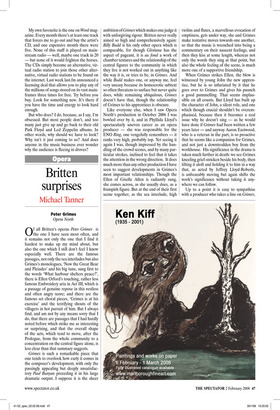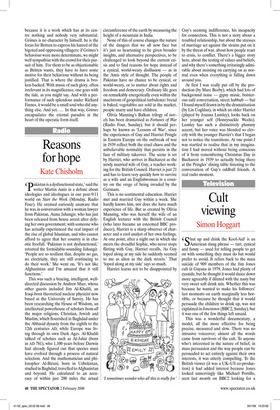Britten surprises
Michael Tanner
Peter Grimes Opera North
Of all Britten’s operas Peter Grimes is the one I have seen most often, and it remains not only the one that I find it hardest to make up my mind about, but also the one which I still don’t feel I know especially well. There are the famous passages, not only the sea interludes but also Grimes’s monologues, ‘Now the Great Bear and Pleiades’ and his big tune, sung first to the words ‘What harbour shelters peace?’, there is Ellen Orford’s touching, rather less famous Embroidery aria in Act III, which is a passage of genuine repose in this restless and often angry score; and there are the famous set choral pieces, ‘Grimes is at his exercise’ and the terrifying shouts of the villagers in hot pursuit of him. But I always find, and am not by any means sorry that I do, that there are passages that I had hardly noted before which strike me as interesting or surprising, and that the overall shape of the acts, which tend to move, after the Prologue, from the whole community to a concentration on the central figure alone, is less clear than that summary suggests.
Grimes is such a remarkable piece that one tends to overlook how early it comes in the composer’s development, with only the passingly appealing but deeply unsatisfactory Paul Bunyan preceding it in his large dramatic output. I suppose it is the sheer ambition of Grimes which makes one judge it with unforgiving rigour. Britten never really aimed so high and comprehensively again: Billy Budd is his only other opera which is comparable, for though Gloriana has the aspect of pageant, it is au fond a work of chamber textures and the relationship of the central figures to the community in which they live is not worked out in anything like the way it is, or tries to be, in Grimes. And while Budd makes one, or anyway me, feel very uneasy because its homoerotic subtext so often threatens to surface but never quite does, while remaining ubiquitous, Grimes doesn’t have that, though the relationship of Grimes to his apprentices is obscure.
Like everyone else, when I saw Opera North’s production in October 2006 I was bowled over by it, and in Phyllida Lloyd’s spectacularly uneven career as an opera producer — she was responsible for the ENO Ring, one vengefully remembers — it ranks very high, probably top. Yet seeing it again I was, though impressed by the handling of the crowd scenes, and by many particular strokes, inclined to feel that it takes the attention in the wrong direction. It does much more than any other production I have seen to suggest developments in Grimes’s most important relationships. Though the Ellen of Giselle Allen is radiantly sung, she comes across, as she usually does, as a frumpish figure. But at the end of their first scene together, as the sea interlude, high violins and flutes, a marvellous evocation of emptiness, gets under way, she and Grimes make tentative moves towards one another, so that the music is wrenched into being a commentary on their nascent feelings, and then they kiss at some length, whereas not only the words they sing at that point, but also the whole feeling of the scene, is much more one of a supportive friendship.
When Grimes strikes Ellen, the blow is witnessed by young John the new apprentice, but he is so infuriated by it that he goes over to Grimes and gives his paunch a good pummelling. That seems implausible on all counts. But Lloyd has built up the character of John, a silent role, and one which though crucial shouldn’t be overemphasised, because then it becomes a real issue why he doesn’t sing — as he would have done if Grimes had been written a few years later — and anyway Aaron Eastwood, who is a veteran in the part, is so proactive that he seems like a companion for Grimes, and not just a downtrodden boy from the workhouse. His significance in the drama is taken much further in death: we see Grimes kneeling grief-stricken beside his body, then lifting it aloft and holding it to him in a way that, as acted by Jeffrey Lloyd-Roberts, is unbearably moving but again shifts the work’s significance without taking it anywhere we can follow.
Up to a point it is easy to sympathise with a producer who takes a line on Grimes, because it is a work which has at its centre nothing and nobody very substantial. Grimes is no character by himself, he is the focus for Britten to express his hatred of the bigoted and oppressing villagers: if Grimes’s behaviour were more determinate, we might well sympathise with the crowd for their pursuit of him. For them to be as objectionable as Britten wants, they have to have some motive for their behaviour without its being justified. That is where the drama is broken-backed. With music of such glory, often irrelevant in its magnificence, one goes with the tide, as you might say. And with a performance of such splendour under Richard Farnes, it would be a small soul who did anything else. And yet.... In that way, Grimes encapsulates the eternal paradox at the heart of the operatic form itself.



































































 Previous page
Previous page